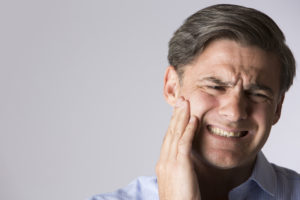 You may have experienced a pop or click sound from your jaw as you eat or yawn. Usually, there is nothing concerning about this sound, but there are some instances when jaw clicking could be indicative of jaw trouble, like temporomandibular joint disorders (TMD).
You may have experienced a pop or click sound from your jaw as you eat or yawn. Usually, there is nothing concerning about this sound, but there are some instances when jaw clicking could be indicative of jaw trouble, like temporomandibular joint disorders (TMD).
One of the key characteristics of TMD is jaw clicking. But not all pops and clicks mean that you are experiencing problems with your TMJ – temporomandibular joint, says Dr. Rahbar. The TMJ is the joint connecting the side of your face (temporal bone) to your lower jaw. Its primary function is to open and close the jaw.
Any clicking sound associated with TMD implies that there is some damage to the bones, cartilage, or ligaments connecting the TMJ; in which case, you should be worried.
How to Know When the Noise is TMD-Related
The most common kind of jaw clicking occurs when the jaws are at their widest, like when yawning or opening your mouth wide for a big bite. This type of clicking is a form of subluxation, caused by the lower jaw bone passing over a ridge in the upper jaw bone. Dentists argue that this is a normal occurrence resulting from a hyperextended jaw.
The other more concerning type of popping occurs when the cartilage-like disc inside the joint is displaced. The clicking occurs somewhat quietly when closing, as the disc slips forward of the lower jaw bone. When you open again, there is a louder crack or pop as the disc repositions itself onto the lower jaw condyle.
The second kind of pop can occur when talking, chewing, or just opening your mouth, and is usually loud enough for people around you to hear. Because the ligament controlling the disc is stretched, plus the muscles controlling jaw movement are affected by the dysfunction, you may experience some pain.
Remedy for Jaw Clicking
Jaw clicking should be definitely addressed, especially if it is painful. If it has never happened before, try reducing your jaw function by switching to a softer diet, or try to relax your jaw if you find yourself clenching. Basically, you will need to identify what your jaw can tolerate and avoid foods that cause your jaw to hurt, at least until it begins to feel more relaxed.
If the popping is caused by an injury to the jaw, some dentists recommend that you wait for 2-3 weeks to see if it resolves on its own. But if the clicking is repetitive, it could be indicative of an inflammatory condition or strain to the muscles that may eventually lead to some arthritic joint degeneration, which then limits jaw function and changes your bite.
In such cases, you should visit your dentist for a proper diagnosis and treatment, possibly with an intraoral appliance (dental splint) to create a buffer for the jaw and teeth to function properly for maximum stability.
 If you’re overly concerned about jaw clicking that you can hear & feel and would like further guidance or direction on what exactly may be occurring, then you can schedule an appointment with our Irvine dentist, Dr. Sohrab Rahbar, for more information. Contrary to popular belief, dentists are more familiar with jaw issues than primary care physicians or your general doctor.
If you’re overly concerned about jaw clicking that you can hear & feel and would like further guidance or direction on what exactly may be occurring, then you can schedule an appointment with our Irvine dentist, Dr. Sohrab Rahbar, for more information. Contrary to popular belief, dentists are more familiar with jaw issues than primary care physicians or your general doctor.
How to Stop Jaw Clicking: When Should I Be Worried?
This entry was posted in Educational and tagged how to stop jaw clicking, jaw clicking remedies, tmd treatment. Bookmark the permalink.